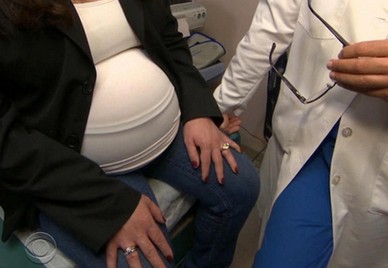Chemotherapy and Pregnancy

Contents:
- Chemotherapy During Pregnancy
- Is it Possible to get Pregnant During Chemotherapy?
- Is Pregnancy Possible After Chemotherapy?
- How to Restore Reproductive Function After Chemotherapy?
- Is Chemotherapy Safe During Pregnancy?
Chemotherapy During Pregnancy
Each year, oncology disease has an increasing trend to spread among the younger generation. Therefore, chemotherapy and pregnancy is a matter of topical interest in medical science.
In case of satisfactory state of health of a woman during cancer treatment and in between courses of chemical therapy, sexual relationship with her partner is quite valid. Therefore, there is a question of perfect interest of many whether one should resort to contraceptive methods during this period and whether an impregnation in fact is possible during chemotherapy. To answer these questions, let`s consider how cytostatics (basic drugs to fight cancer) affect a woman's reproductive system.
Is it Possible to get Pregnant During Chemotherapy?
Depending on their composition, chemicals do varying degrees of damage to ovaries. Some of them do not affect on their functioning, while others cause serious changes of reversible or nonreversible type in tissues. The most toxic drug for women's health is "Cyclophosphamide".
The degree of damage of the same drug is different and depends on:
- age of a woman;
- drug class;
- duration of use.
Changes in the ovaries after delivery of "chemo" can be functional and structural:
- reduction of follicles until their disappearance and fibrosis (substitution by conjunctive tissue with scarring);
- damage of maturing follicles;
- destruction of the ovarian structure – oocytes (ovules) and granulosa cells;
- occurrence of premature ovarian failure (POF).
One of the main side effects of chemotherapy of women is amenorrhea (absence of menstrual cycle).
Young girls have less expressed functional abnormality of the ovaries, and there are temporary dysfunctional changes as cycle disturbances. Adult women develop menopause. This is due to the fact that their number of oocytes is much fewer.
The impact of drugs on biological ability of women to conceive (fertility) during treatment is not fully studied and is unpredictable.
It is important!
To become pregnant during chemotherapy is categorically IMPOSSIBLE for two reasons. First, the chemicals are toxic to the fetus, leading to his abnormal development or death. Second, a significant hormonal adjustment happens in woman`s body during pregnancy. The hormonal release can cause rapid tumor growth and provoke its metastasis.
Therefore, female patients of oncology department have a special field "contraceptive methods" in their case history, ways and means of contraception are selected by a physician for each woman individually.
Is Pregnancy Possible After Chemotherapy?

The risk of infertility after the undergone chemotherapy is great. It can be temporary or permanent.
The timing of the resumption of the reproductive function of women depends on:
- severity of the past disease and tumor localization (for example, in case of ovarian cancer, the risk of infertility increases);
- type of chemicals- specific ones have a small dose of gonadal toxicity (toxic to the reproductive glands), nonspecific ones have a high dose;
- number of courses of chemotherapy;
- recovering capacity of an organism;
- age.
Based on the medical practice observations, recovery period after chemotherapy lasts from 2 to 5 years. Young women up to 30 years of age have all chances to conceive naturally, carry fetus to term and give birth to a healthy baby. After 30, these chances rapidly dwindle. However, one should not hold that reproductive function can be fully recovered.
Given this fact, before assigning such treatment for a woman of reproductive age, each doctor must find out, whether she plans pregnancy in the future. If she does, then, to preserve and protect the ovaries for the time of treatment, special blocking drugs are prescribed.
How to Restore Reproductive Function After Chemotherapy?
There are the newest methods of preserving fertility after chemotherapy. One of them is vitrification of oocytes (delayed motherhood). The procedure is about taking out oocytes based on paracentesis of ovary with their subsequent freezing. Thus, sometime later after chemotherapy, a woman can become pregnant through IVF.
To remove the irregularities in the genital sphere after chemical therapy, doctors prescribe medicamental preventive therapy and herbal medicine, which consists in prescription of antioxidants and agonists.
Antioxidants are negatively charged molecules that attract toxins and remove them from the body. Most of their contents is in vegetables, fruits, greens.
Agonists are substances, which fully depress the function of cells, interacting with receptors. Their main task is to disable the process of dividing of blast (immature predecessors of ova) cells of the ovaries. While at rest, germ cells are minimally affected by chemotherapy.
The main groups of plants to restore reproductive function after a chemotherapy treatment are:
- Antioxidant – brier, rosemary, hawthorn, Artemisia.
- Antigonadotropic – red-rooted gromwell, common comfrey.
- Containing phytoestrogens – snail clover, common hop, meadow clover, licorice, sage.
- Adaptogens – Rhodíola rósea, Eleuterococus, Asiatic ginseng, Manchurian aralia.
Herbs increase ovarian secretion of sex steroids and restore the maturation of the ovum.
It is important!
The decision about the forthcoming pregnancy should not be emotional, but considered and accepted not only by the woman herself, but also by oncologists, gynecologists, family members as well. It is a pledge of success of the future pregnancy and baby health!
Is Chemotherapy Safe During Pregnancy?
What to do if the diagnosis of oncological diseases is determined during pregnancy? Generally, women learn about the existence of possible tumors from gynecologist, who watches them.
First and foremost, the tumor size, its structure and nature of its dynamics are rated. If there is a reason (slow tumor growth), the timing of chemotherapy is deferred to the postnatal period.
If the treatment in the first trimester is inevitable, the abortion is justified in such a case, because the chemicals cause fetal abnormalities incompatible with life. At late stages, when the process of anlage of organs and systems of the fetus is completed, chemotherapy is conducted.
However, the following complications can happen:
- prematurity and premature birth;
- small-for-date newborns;
- infringement or absence of lactation.
Chemotherapy can also be used to eliminate an ectopic pregnancy. The drug "Methotrexate" is an effective alternative to surgery. It does not only eliminate the ovum, but also restores the patency of the fallopian tubes. This method is used when the size of the embryo does not exceed 3.5 cm.
In certain situations, chemotherapy and pregnancy are perfectly compatible. And, contrary to all the myths and prejudices, treating by chemotherapy does not deprive a woman of happiness of motherhood.